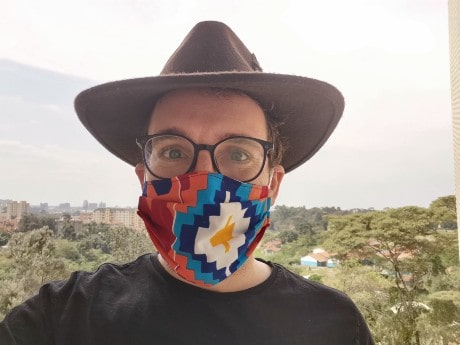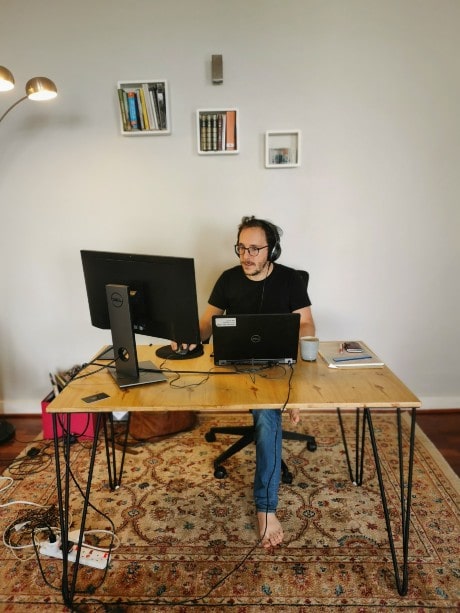
My most recent humanitarian mission was completely different from anything I’d ever experienced before, and I’ve been in the humanitarian sector for 10 years now. I was “deployed” in Nairobi, Kenya to support priority countries across the region alongside the International Federation of the Red Cross, the coordinating body of the Red Cross Movement.
I put deployed in quotation marks because I wasn’t really deployed to Nairobi. I was already there. Nairobi has been my home since 2019. This time, I was not flying to a country hit by a hurricane or an earthquake, I was not packing to face a war or a population movement. I was deployed at home to face a threat we cannot see. A threat we cannot negotiate with. The global pandemic of COVID-19.
My role in this response was also quite different than what I’m used to. Usually I work as a team leader alongside the National Society, which includes jobs like managing a team to provide medical care, rebuild water systems, or to carry out community engagement activities. On these deployments I am in daily contact with the people affected. I can talk to them, see their life and their challenges, witness their strength and their resilience. But how do you do that when the whole continent is affected, from Cairo to the Cape of Good Hope, from Dakar to Zanzibar? How do you work directly with the population when the crisis is at this scale?
Actually, we do have a way.
The Red Cross Movement has 12 million active volunteers worldwide. If it was a country, it would be more populated than Cuba, Austria, or Portugal. Beyond this, the Movement prioritizes aid that is as local as possible, and only as international as necessary. There are Red Cross and Red Crescent branches across Africa and all of them were ready to respond.
Just like in any other crisis, the volunteers are on the frontline. But this time the risks are different. We need to support the population facing the pandemic, while ensuring our teams don’t also fall victim to it. This is where I come into play. My role was to develop and share simple and achievable ways for our teams in the field to avoid being exposed to the virus, allowing them to continue to support their communities. From social distancing, wearing face masks, using rotating teams, work-from-home protocols, and medical evacuation. All the ways we work needed to be revised and adapted to the new normal of the COVID-19 context.

Every day I was in communication with our teams in Madagascar, Zimbabwe, Central African Republic, South Sudan, and others across the region discussing the limitations and finding solutions for each specific context. In Goma, the project manager mentioned that the office is in the same compound where people live, so the recommendation to work from home didn’t make much sense, which forced us to adapt in other ways.
In South Sudan we had hard conversations about staying or leaving. Some of our team were at risk because of their age group but didn’t want to stop their work even when they knew the border would close and medical evacuation might not be possible in case of infection. Local Red Cross and Red Crescent staff weren’t able to leave, so we also worked on ways to keep them as safe as possible.
Of course, all this work was done at a distance through video conferencing, which was another new experience for me. Human contact, in time of crisis, is incredibly important and to have this barrier between me and my colleagues was an additional challenge to creating those bridges and building trust. But humans have this incredible capacity to adapt.
We adapted fast. Community engagement was done more and more through online platforms. For example, African artists in collaboration with the Red Cross got together to raise awareness about COVID-19 through an online concert: Africa Together, in French and English. We reached thousands of people through social media across the continent.
Now we are facing another impact of the crisis. The measures being implemented to reduce the transmission of the disease like curfew, shops and restaurants closures, limitation of movement, closure of borders and so on, have an immense impact on the livelihood of thousands of people. Many people lost their incomes and are not able to provide for their family. The health systems and vaccination campaigns for other serious illnesses were disrupted, education of thousands of young people had to be put on hold.
I’m “back home” from my deployment now and the streets of Nairobi are populated by people wearing masks. A new mask fashion industry has even developed with some amazing African fabrics. But the number of new cases reported continues to rise. This crisis is far from over. It’s not a sprint, it’s a marathon. However, our work continues to assist those affected directly and indirectly by the crisis.
To support our Global COVID-19 Appeal go to our website here.

